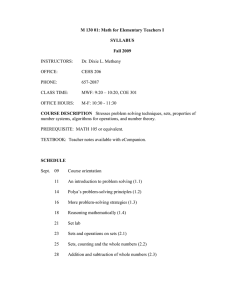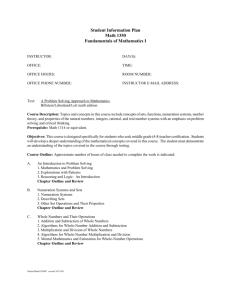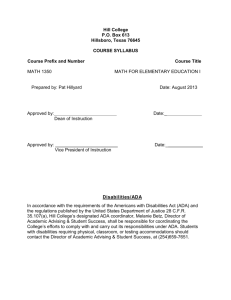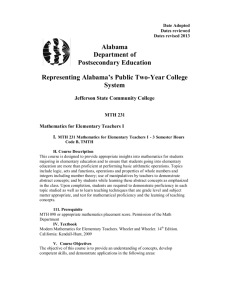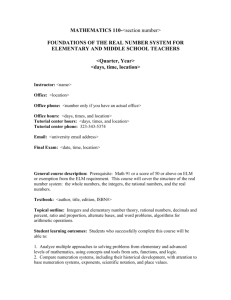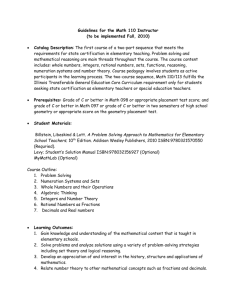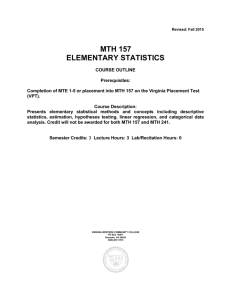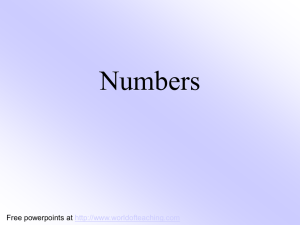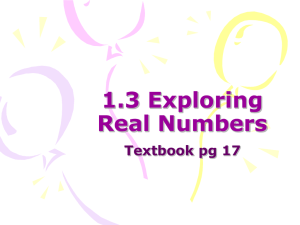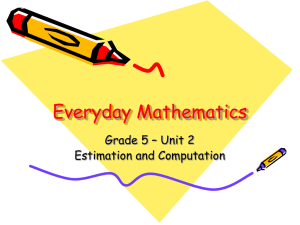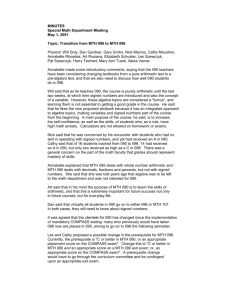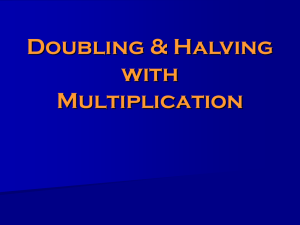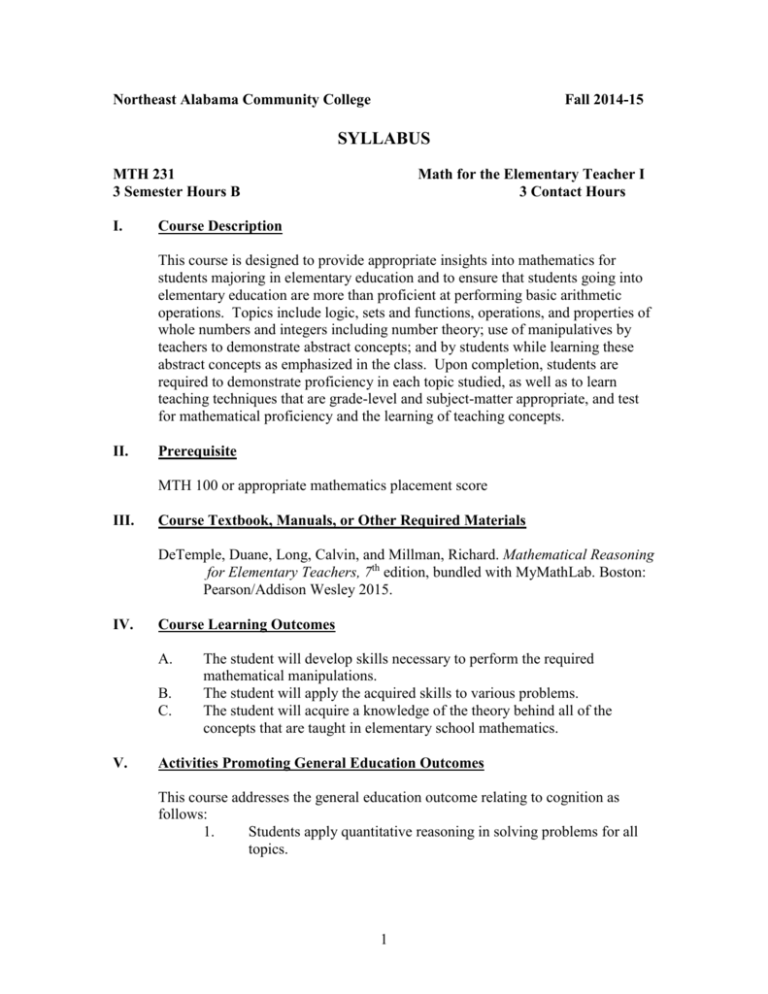
Northeast Alabama Community College
Fall 2014-15
SYLLABUS
MTH 231
3 Semester Hours B
I.
Math for the Elementary Teacher I
3 Contact Hours
Course Description
This course is designed to provide appropriate insights into mathematics for
students majoring in elementary education and to ensure that students going into
elementary education are more than proficient at performing basic arithmetic
operations. Topics include logic, sets and functions, operations, and properties of
whole numbers and integers including number theory; use of manipulatives by
teachers to demonstrate abstract concepts; and by students while learning these
abstract concepts as emphasized in the class. Upon completion, students are
required to demonstrate proficiency in each topic studied, as well as to learn
teaching techniques that are grade-level and subject-matter appropriate, and test
for mathematical proficiency and the learning of teaching concepts.
II.
Prerequisite
MTH 100 or appropriate mathematics placement score
III.
Course Textbook, Manuals, or Other Required Materials
DeTemple, Duane, Long, Calvin, and Millman, Richard. Mathematical Reasoning
for Elementary Teachers, 7th edition, bundled with MyMathLab. Boston:
Pearson/Addison Wesley 2015.
IV.
Course Learning Outcomes
A.
B.
C.
V.
The student will develop skills necessary to perform the required
mathematical manipulations.
The student will apply the acquired skills to various problems.
The student will acquire a knowledge of the theory behind all of the
concepts that are taught in elementary school mathematics.
Activities Promoting General Education Outcomes
This course addresses the general education outcome relating to cognition as
follows:
1.
Students apply quantitative reasoning in solving problems for all
topics.
1
2.
3.
VI.
Students use critical thinking skills in logically and analytically
demonstrating the theory underlying all concepts taught in
elementary school mathematics.
Students must synthesize math knowledge and skills to solve those
problems involving arithmetic and algebraic topics.
Outline of Course Topics
A.
Thinking Critically
1.
An introduction to problem solving
2.
Polya’s problem solving principles
3.
Reasoning mathematically
B.
Sets and Whole Numbers
1.
Sets and operations on sets
2.
Sets, counting, and whole numbers
3.
Addition and subtraction of whole numbers
4.
Multiplication and division of whole numbers
C.
Numeration and Computation
1.
Numeration systems past and present
2.
Nondecimal positional system
3.
Algorithms for adding and subtracting whole numbers
4.
Algorithms for multiplication and division of whole numbers
5.
Mental arithmetic and estimation
6.
Getting the most out of your calculator
D.
Number theory
1.
Divisibility of natural numbers
2.
Tests for divisibility
3.
Greatest common divisors and least common multiples
Integers
1. Representations of integers
2. Addition and subtraction of integers
3. Multiplication and division of integers
E.
F.
G.
Fractions and Rational Numbers
1. Basic concepts of fractions and rational numbers
2. The arithmetic of rational numbers
3. The rational number system
Decimals and Real Numbers
1. Decimals
2. Computations with decimals
3. Ratio and proportion
4. Percent
2
VII.
Methods of Instruction
A.
B.
C.
D.
E.
Lectures
Class discussion
Computer/Internet Tutorials
Video tutorials
Individual instruction (instructor and tutors)
VIII. Evaluation and Assessment
A.
The course grade will be determined by the following methods:
1.
2.
3.
4.
5.
6.
7.
8.
Written and oral quizzes
Written exams
Oral presentations (individual and/or group)
Homework
Class participation
Projects
Computer activities
Comprehensive final exam
The individual instructor and/or department will determine grades based
upon the following: A=90-100%, B=80-89%, C=70-79%, D=60-69%,
and F=below 60%.
B.
Departmental Assessment of General Education Outcomes
Cognition
1. Quantitative reasoning- This general education outcome will be
assessed by an activity requiring the student to demonstrate understanding
of the multiplication and division algorithms.
2. Critical thinking skills and synthesis of knowledge-This general
education outcome will be assessed by an activity requiring the student to
demonstrate the ability to use the instructional algorithms for
multiplication and/or division. Time permitting, this activity should
ideally be done by having the student go to the board and demonstrate this
in front of the class.
Students will demonstrate attainment of the general education outcome of
cognition with at least 70% proficiency.
Every five years all MTH 231 instructors (day, evening, internet, and dual
enrollment) will conduct an assessment of the course. The appropriate
3
forms will be completed by each instructor and submitted to the division
chair.
C.
Use of Assessment Findings
During the Fall inservice of the year following the scheduled review of
MTH 231, a committee will review all course assessment materials
submitted by the instructors and division chair. The committee will
submit a report of any recommended curriculum changes for MTH 231 to
the division chair, who will then submit them to the Student Learning
Outcomes Committee. Upon approval by the Student Learning Outcomes
Committee, a copy will be filed with the Office of Institutional Planning
and Assessment.
IX.
Attendance
Students are expected to attend all classes for which they are registered. Students
who are unable to attend class regularly, regardless of the reason or circumstance,
should withdraw from that class before poor attendance interferes with the
student’s ability to achieve the objectives required in the course. Withdrawal
from class can affect eligibility for federal financial aid.
X.
Statement on Discrimination/Harassment
Northeast Alabama Community College and the Alabama State Board of
Education are committed to providing both employment and educational
environments free of harassment or discrimination related to an individual’s race,
color, gender, religion, national origin, age, or disability. Such harassment is a
violation of State Board of Education policy. Any practice or behavior that
constitutes harassment or discrimination will not be tolerated.
XI.
Statement of Adherence to ADA Guidelines
Instructors will adhere to the Americans With Disabilities Act and/or Section 504
of the Rehabilitation Act (1973) and will publish the following statement on
course outlines given to students at the beginning of each semester: “Any
individual who qualifies for reasonable accommodations under the Americans
With Disabilities Act or Section 504 of the Rehabilitation Act (1973) should notify
the instructor immediately.”
4

